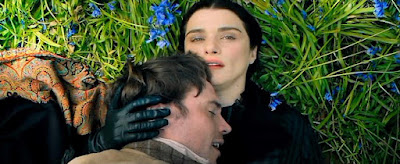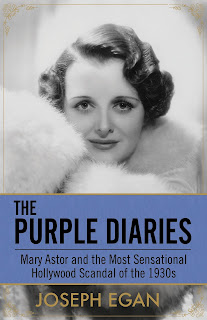 |
| Blown Away: Nicole Eggert, Corey Haim |
Here we are again, with reviews-in-brief of movies that are less than twenty-five years old.
Blown Away (1997). Director: Brenton Spencer. Predictable thriller about a young man (Corey Haim) caught in the spell of a young woman (Nicole Eggert) who wants to kill her father. Corey Feldman makes more of an impression as the man's older brother. There's a fairly good final twist. The Canadian film almost approaches porn at times. **.
Red Eye (2005). Director: Wes Craven. A young Miami hotel manager (Rachel McAdams) meets a seemingly nice guy (Cillian Murphy) at the airport only he turns out to be a creep involved in a terrorist plot, and threatens her father's life during the flight unless she does as he demands. The two leads give notably effective performances and the film is suspenseful and exciting. Oddly, the last third of the movie and the climax itself take place on the ground. ***.
Scoop (2006). Writer/director: Woody Allen. In this whimsical black comedy a magician (Allen) and an aspiring reporter (Scarlett Johansson) are contacted by a dead journalist (Ian McShane) and team up to find out if a prominent Britisher (Hugh Jackman), son of a lord, is the notorious Tarot card serial killer. Cute and suspenseful, with some very funny dialogue and good performances, the movie is basically just an entertaining throwaway for Allen. ***.
State of Play (2009). Director: Kevin Macdonald. Based on a BBC mini-series, this follows a reporter (Russell Crowe, looking like something the cockroaches dragged in) who teams up with a blogger (Rachel McAdams) to investigate the death of a congressional aide who was also the mistress of his friend (Ben Affleck), and butts heads with his editor (Helen Mirren) as more murders occur. The leads all give very good performances, as do Robin Wright, Jeff Daniels, and Jason Bateman in smaller roles. Suspenseful, but somewhat predictable. ***.
The Social Network (2010). Director: David Fincher. The movie tells the more-or-less true story of the founding of Facebook and the behind-the-scenes legal battles that went on when the social media site promised to turn into a real money-maker. The movie is well-acted by a mostly youthful cast, and it certainly gets points for making an entertaining film out of something that (in certain instances) can be as dull as Facebook. ***.
Thin Ice (aka
The Convincer/2011). Director; Jill Sprecher. An insurance salesman (Greg Kinnear) and a psychotic locksmith (Billy Crudup) wind up in a deadly situation together when the former decides to cheat an elderly client (Alan Arkin) out of a valuable violin. This black comedy is quite entertaining and unpredictable, although it turns out to be quite far-fetched as well. Bob Balaban scores as a violin dealer. ***.
Journey 2: The Mysterious Island (2012). Director: Brad Peyton. This sequel to the less effective
Journey to the Center of the Earth (2008) suggests that Jules Verne's books are actually non-fiction, so a young man and his stepfather manage to journey to the island of Verne's
Mysterious Island. This in no way compares to the
1961 version, but it has its own charms, including good performances (especially from Michael Caine), excellent special effects featuring an assortment of colorful creatures, and superb scenic design. If only it didn't have that "cutesy" tone throughout. This has even less to do with Verne's book than the 1961 film. ***.
Jersey Boys (2014)
. Director: Clint Eastwood. Based on the Broadway show, this traces the rise and fall of the singing group The Four Seasons. Initially the sound these young actors reproduce sounds much like the originals, but then you realize (especially when you hear the real group over the closing credits) that the Four Seasons can't really be duplicated. The acting in this is okay; producer- lyricist Bob Crewe is played as a gay stereotype, and there are tiresome Italian-American cliches as well. The best scene in this long movie happens just as the closing credits begin: a terrific production number with great dancing set to "Oh, what a night!" Not a great movie, but entertaining enough. ***.
Before I Go to Sleep (2014). Director: Rowan Joffe. As in
Memento, a young woman (Nicole Kidman) has a condition in which her memories disappear overnight and she has to be reminded of her own life every morning. She has a loving husband (Colin Firth) and a caring doctor (Mark Strong), but is frightened to learn that she was nearly beaten to death some years earlier and that she had a son who died. Things get more sinister and twisty after that. Well-acted by all, this is a rarity: a poignant thriller. ***.
Meadowland (2015). Director: Reed Morano. A couple's little boy completely disappears at a gas station. The movie isn't concerned with an investigation into the crime or even what happened to the child, but rather reveals the emotional unraveling of the two parents as they try to deal with their grief. By trying too hard not to be a "mere" thriller or suspense film,
Meadowland -- another of these "minimalist" pictures -- doesn't become much of anything, and while well-acted, is never as moving nor as riveting as it should have been. **1/2.
Self/Less (2015). Director: Tarsem Singh. In a variation of the vastly superior
Seconds, a billionaire (Ben Kingsley) buys himself what he thinks is a new young body that was grown in a lab. But complications ensue when it turns out said body actually belongs to a soldier (Ryan Reynolds) with a wife and child, and whose memories are slowly returning. Nice conclusion, and some interesting developments, but the movie tries too hard to be an action movie with a high body count and isn't all that it could have been. **1/2.
Hello, My Name is Doris (2015). Director: Michael Showalter. Doris (Sally Field), a woman of a certain age (Field was about 70), falls for a much, much younger colleague (Max Greenfield) and hopes for a real relationship with him, to the consternation of her best friend (Tyne Daly) and the delight of said friend's grand-daughter. Frankly, you have to take this likable comedy-drama with a grain of salt, as a lot of it doesn't ring true, but Field gives an outstanding performance and the others are all terrific. The film does explore the fact that seniors can fall hard for much younger people and still hope to find that certain someone. ***.
The Program (2015). Director: Stephen Frears. The rise and fall of Lance Armstrong, cancer survivor, seven time winner of the Tour de France, and a complete phony and cheat who used drugs (and pressured his teammates into same) to help him win. This operates on the level of a TV movie, with little depth or psychological probing, but Ben Foster is quite effective in the lead. ***.
Confirmation (2016). Director: Rick Famuyiwa. Fictionalized film about the Supreme Court confirmation hearing for conservative Judge Clarence Thomas (Wendell Pierce) and the charges of harassment made by former co-worker Anita Hill (Kerry Washington). This whole she said/he said scenario remains fascinating and controversial after all of these years. The movie suggests objectivity, but seems slanted in favor of Hill. 50% of the American public thought that both Thomas and Hill weren't telling the
whole truth, and that's the impression I got as well. In any case, the film is well-acted and completely absorbing. ***.
Sacrifice (2016). Director: Peter A. Dowling. Tora, an American doctor (Radha Mitchell), moves back to her husband's childhood home, an isolated island, where she discovers a corpse on their property and new ties to an ancient sect with murderous capabilities. This nominal horror film/thriller is well-produced and acted, even if it's plot is fairly obvious and TV-movie like. However, it does have a suspenseful and exciting climax. **1/2.
Inferno (2016). Director: Ron Howard. This second sequel to
Da Vince Code has Tom Hanks rather wasted in a thriller that has him hopping around Europe to some admittedly interesting and colorful locations in order to stop a deadly plague from being unleashed by a psychotic billionaire (Ben Foster). The picture has some exciting sequences, but it just misses being a really excellent suspense film. **1/2.
The Girl on the Train (2016). Director: Tate Taylor. Rachel, an alcoholic (an excellent Emily Blunt) who can't deal with her ex-husband dumping her for a new wife, begins to bond with another woman she sees from a train window. When this woman -- who resembles the ex's new wife -- disappears, Rachel wonders if she herself may have been somehow responsible. The bouncing around in time may have worked in the source novel, but it doesn't work that well in the movie, which eventually becomes tedious. The only halfway likable character is a lady detective played by Allison Janney. The "sisterhood is powerful" sub-text doesn't quite work considering how unsympathetic most of the characters are. **.


























